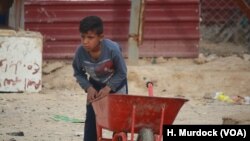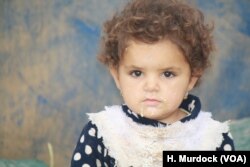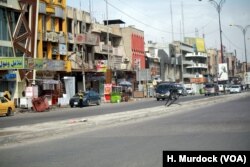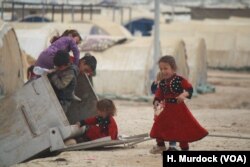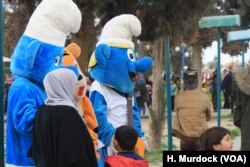"The children feel lonely because their father is gone," says Hassiba, who is raising her seven children alone in a desert camp outside of Mosul. "Other children beat them, saying, 'Your father was a terrorist.'"
Her husband was an accused Islamic State fighter. He is either in jail or dead, but she doesn't know which. Abdul Kareem, her 12-year-old son, now provides the family's only income by transporting random items in his cart. On his best days, he makes about $2.
Abdul Kareem is among tens of thousands of Iraqi children whose fathers were accused militants, arrested or killed in Islamic State's losing battle. And while these children mourn, the rest of the world celebrates their loss.
"I tell them to be patient and leave it to God," Hassiba says. "I tell my children the other kids are lying about their father and not to fight."
Still, she says, she fears the children will grow up angry without community acceptance and education. "I would even educate my daughters if there was a school," she says. "I want my children to be educated to prevent any desire for revenge."
Hassiba says she does not know if her husband fought for IS, but she does know her children saw him only as a loving father.
"We worked together selling things from our cart," says Mubarak, 13, Hassiba's oldest child, who has battled an unknown mental illness since long before the days of IS. "Life was fun."
Protecting lives before minds
Hundreds of thousands of other children are also traumatized by war and extremism in Iraq, and authorities and aid organizations are struggling to rebuild schools and develop mental health programs for all of them. But special programs to treat children of IS fighters are almost non-existent.
In the camps, the constant scramble to provide enough food, protection and emergency health care for families still fleeing their homes are the most urgent issues, according to aid workers.
Many of the families are the wives and children of IS fighters, forced from their homes by neighbors, local leaders, or other IS victims angered by three years of brutal, extremist rule.
Providing care specific to the children of IS could do more harm than good as groups seek revenge on IS supporters — both real and perceived, says Ardalan Maroof, a camp manager for the International Organization for Migration in northern Iraq.
Special programs could bring unwanted attention, he adds, making outsiders see certain camps as "IS camps" rather than camps for displaced families.
Already, he says, there are constant threats.
"Armed groups can take them," he explains. "A thousand families recently asked for internal relocation inside the camp in less than a month."
Dreams to forget
On the other side of the camp, in a tent crowded with women and children, Bahija Idris says she tries to forget her husband, who was killed fighting for IS. But her son, 5-year-old Mustafa, cannot.
"He dreamt today his father left money under his pillow," she explains wistfully. "When he woke up, he was looking for the money."
WATCH: Children Find Healing at Mosul Amusement Park
Everyone in the tent is mourning fathers, husbands or brothers who joined IS and are now dead or in jail. Local leaders say their best hope for recovery is to forget.
"We have to forget things or we will all go crazy," says Hajjer, a teenage dressmaker who says the men in her family joined IS after they were all "tricked by religion."
"I nearly went crazy when I saw the picture of my dead brother," she adds. "Also, when they arrested my father."
Generation of trauma
Dozens of kilometers north of the camp, in eastern Mosul, teachers say even in the safest, most rebuilt former-IS areas, education and mental health treatment for children is lacking.
"The villages around the city have no water and electricity, so people are crowding into this area," explains Mothar Haitham, a high school Arabic teacher in Mohandiseen, an upscale neighborhood of stately homes and small businesses. "I have 73 students in my class."
There is a plan to address mental trauma, he adds, but it hasn't yet been implemented. At the moment, the Iraqi government and organizations like the U.N. Children's Agency, UNICEF, are still working to simply reopen many of the schools.
"While living in areas like Mosul, simple, playful activities were also curtailed and children were essentially robbed of their childhood," explains Laila Ali, a spokesperson for UNICEF in Iraq. "Once the offensive started, children and families fled the conflict under extremely traumatizing circumstances, often under intense bombardment, which further compounded their shock."
Neighbors in Mohandiseen see educating the children whose parents had nothing to do with IS as a priority, but they pause to consider the special needs of the children of IS.
"It only makes sense that they will grow up angry if they don't get help," says Mohammad, 28, standing outside a small butcher shop. "IS killed my brother. Do you think if I see an IS fighter I won't want to kill him?"




